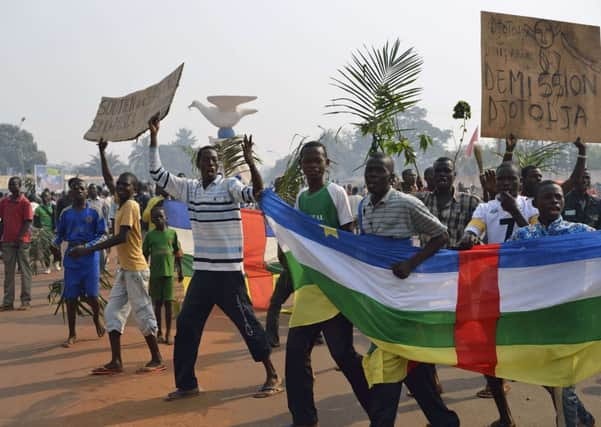CAR: Interim president Djotodia resigns


The resignations of Mr Djotodia and his prime minister Nicolas Tiangaye yesterday were announced in a statement issued at a two-day summit of the Economic Community of Central African States (CEEAC) in neighbouring Chad.
Talks to decide on new leadership will take place in Central African Republic, it said.
Advertisement
Hide AdAdvertisement
Hide AdThousands of people have been killed and one million displaced by cycles of violence since abuses by Mr Djotodia’s mainly Muslim rebels, known as Seleka, prompted the creation of Christian self-defence militia after he seized power in March.
With memories of Rwanda’s 1994 genocide stirred by the unrest, France sent hundreds of troops to its former colony last month to support African peacekeepers.
However, the killings have continued, and France has repeatedly voiced its frustration with Mr Djotodia’s government. Mr Djotodia and Mr Tiangaye resigned after Central African Republic’s transitional assembly was summoned to the Chad summit late on Thursday to decide on the country’s future.
Under an agreement brokered by the CEEAC last year, the assembly elected Mr Djotodia to his position as interim president in April to take Central African Republic to elections, due at the end of this year.
“We take note of the resignation. It is up to the assembly to decide what happens now,” said French foreign ministry spokesman Romain Nadal. “France does not interfere in any case with this process.”
The regional leaders, led by Chad’s Idriss Deby, a French ally, had run out of patience with Mr Djotodia.
As news from the summit reached the capital, thousands of residents took to the streets, dancing, singing and honking horns in celebration. Cheers erupted at a camp for 100,000 displaced Christian civilians at the French-controlled airport.
“It’s a new day for Central African Republic. God has heard our crying and our prayers,” said Jeanne, a 71-year-old woman in Bangui, outside a shop where she said her son was killed by Seleka in March.
Advertisement
Hide AdAdvertisement
Hide AdAs evening approached, many people returned home, fearing overnight reprisals by former rebels who remained. Residents in several neighbourhoods reported Seleka gunmen firing into the air in order to clear their path to leave.
French armoured vehicles were deployed outside the presidential palace.
France has 1,600 troops in the country, operating under a United Nations mandate to assist an African force that is due to be bolstered to 6,000 men. It strengthened its military presence on the streets yesterday.
European Union officials proposed this week sending EU troops to support them.
The UN peacekeeping mission in neighbouring Democratic Republic of Congo said this week it was worried about the large numbers of Seleka fighters that had crossed the border.
The loose band of rebels was held together by frustrations over underdevelopment of the north and desire for control over the country’s reserves of gold, diamonds, uranium and oil.
Many of its men were battle-hardened fighters from Chad and Sudan.